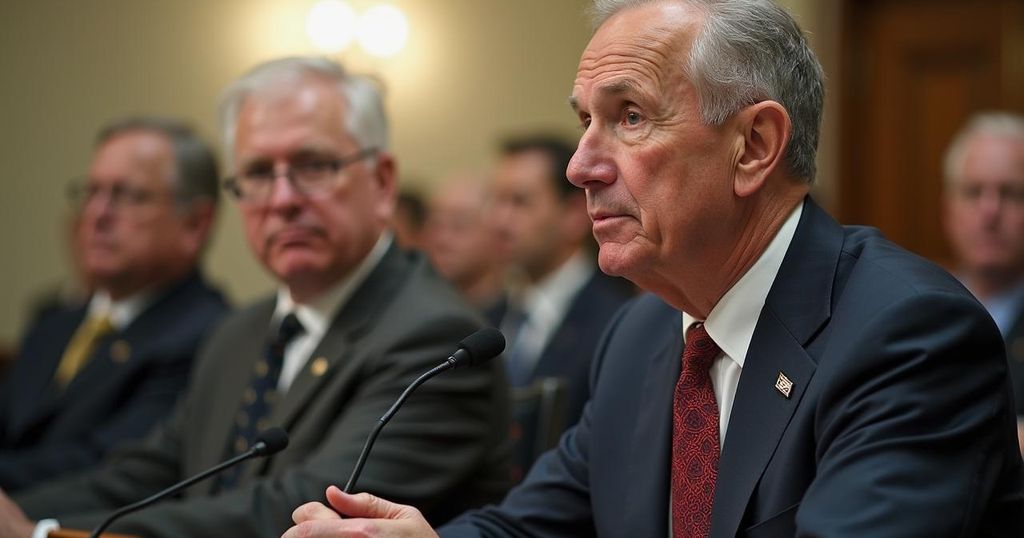House Republicans Blame Biden Administration for Chaotic Afghanistan Withdrawal
House Republicans have issued a report blaming President Joe Biden for the disorganized withdrawal from Afghanistan, asserting that the administration failed to prepare adequately for the Taliban’s rapid takeover. The investigation critiques decisions made during the evacuation process while noting that the issues are not exclusive to Biden, as previous administrations, including Trump’s, also share responsibility. The politicization of the withdrawal is set against the backdrop of the upcoming presidential election, with implications for Republican campaigns.
House Republicans have released a critical report accusing President Joe Biden’s administration of responsibility for the tumultuous conclusion to the United States’ long-standing involvement in Afghanistan. The investigation highlights perceived failings in military and civilian protocols during the final months of withdrawal and significantly downplays the impact of former President Donald Trump’s previous agreements with the Taliban. The report contends that the hasty evacuation, which culminated in August 2021, left vulnerable individuals, including American citizens and Afghan allies, abandoned in the wake of Taliban dominance. Republican Representative Michael McCaul, chair of the House Foreign Affairs Committee, stated that the Biden administration did not adequately prepare for the swift collapse of the Afghan government. He claimed that the administration prioritized political optics over security, leading to mismanagement of the evacuation strategy. In response to accusations of political motivations behind the timing of the report’s release, McCaul asserted that Republicans were simply fulfilling their investigative duties without neglecting Trump’s contributions to the situation. The report, however, does not introduce groundbreaking insights, as the complex nature of the withdrawal has been scrutinized through various independent analyses which attribute blame across multiple presidential administrations, including both Biden and Trump. A spokesperson for the Biden administration, Sharon Yang, criticized the report for its selective use of information and biased interpretations, emphasizing that Biden inherited a challenging predicament due to Trump’s unilateral deal with the Taliban. During its 18-month inquiry, the Republican committee highlighted systemic failures within the State Department while emphasizing that inadequate assessments and decisions significantly influenced the withdrawal timeline. Key testimonies indicated a lack of strategic foresight concerning the Taliban’s rapid territorial gains. A former military official likened the Taliban’s progression to a “Red Blob” overtaking the country, urging that the impending crisis had been considerably underestimated. In December 2021, the Taliban regained control of Afghanistan, ultimately challenging the stability and security of the region and leading to concerns about the resurgence of extremist groups. The comprehensive review compiled by House Republicans consisted of extensive testimonies and documentation, reflecting hours of discussions with senior officials and a significant volume of reviewed materials. As the political landscape moves towards the next presidential election, different factions are attempting to capitalize on the fallout of the Afghanistan withdrawal, with specific emphasis placed on Vice President Kamala Harris’s role, albeit without pinpointed details on her direct contributions to the reported failures. The narrative continues to evolve as both parties contemplate their respective positions in addressing the consequences of the U.S. withdrawal from Afghanistan.
The article discusses a report released by House Republicans which places blame on President Joe Biden’s administration for the chaotic withdrawal of U.S. forces from Afghanistan, characterizing the end of the 20-year military engagement as mismanaged. The document emerges from an investigation that scrutinizes actions taken during the evacuation process that unfolded in the summer of 2021 and assesses the implications of a deal made by former President Donald Trump with the Taliban. As the U.S. experienced a tumultuous exit from Afghanistan, concerns about the safety of remaining Afghan allies, citizens, and others were raised. The political ramifications of the withdrawal and accountability from both major parties remain contentious topics ahead of the upcoming presidential election.
In conclusion, the report by House Republicans reflects a significant political critique directed at President Biden regarding the U.S. withdrawal from Afghanistan, while it has been argued that the analysis fails to fully account for previous actions taken by the Trump administration. The inquiry underscores the importance of cross-administration collaboration and strategic planning in military operations, highlighting overarching systemic issues in the U.S. foreign policy approach. As the political landscape shifts, the fallout from the withdrawal from Afghanistan remains a critical issue for both parties going forward.
Original Source: www.pbs.org




Post Comment